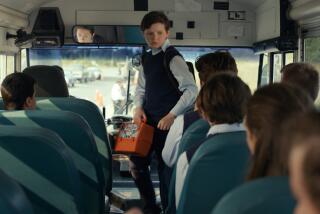Television review: The Kids in the Hall’s ‘Death Comes to Town’
- Share via
Like getting into the Beatles via their later solo albums, I came at the Canadian comedy troupe the Kids in the Hall, whose self-titled series ran from 1989 to 1995 on HBO and CBS, late and backward, through the individual work of members Dave Foley (“NewsRadio”), Scott Thompson ( “The Larry Sanders Show”) and Mark McKinney (the marvelous “Slings and Arrows,” which he also co-wrote). ( Bruce McCulloch and Kevin McDonald are the other Kids, I write parenthetically but not slightingly.) Then I saw them at UCLA in 2007, warming up for their 2008 reunion tour, and did I laugh!
That tour was built around the group’s first body of new work in more than a decade, and this creative Indian summer has carried them all the way back to television for “Death Comes to Town,” a gothic murder mystery cum small-town soap opera in eight episodes that begins Friday on IFC. They share all the main roles among them, abetted by a few supporting players who have the look of being famous in Canada, where the show has already aired, and where it’s set. Canadian content includes jokes about April Wine and Calgary.
It is not a laugh riot, exactly, which old fans might expect or hope for or fear will not be forthcoming; but it’s good — a rather gentle comedy about gruesome things, in which the energy is invested less in gags than in story and character. More than a skein of sketches strung out into something resembling a plot, it has a genuine narrative flow that carries the viewer along and gives five able comic actors a chance to put on some wigs and dresses and do their stuff. (As the mayor’s wife, Foley makes an especially convincing and attractive, albeit usually inebriated, middle-aged woman.) The pleasures are largely in the performances.
It is also a proper mystery with multiple likely suspects and red herrings: There are long-held family secrets, intertwining strands of love and lust, a bumbling constabulary, a pair of citizen detectives; it’s just that one of the characters unusually happens to be the Grim Reaper (McKinney). A scythe-wielding, potbellied demon cooling his heels in a lakeside motel, waiting for his assignments, like a hit man in any number of art movies over the last couple of decades, he relieves the boredom by hanging out in the local bar and chasing zaftig redheads.
Even though it involves murder, public execution, necrophilia and abortion, death is less a subject for satire here than it is a plot point, a motif. The most cutting turn on the subject matter has to do with a 32-year-old cat being kept alive by extraordinary measures; these scenes are authentically and deeply disturbing.
The characters are mostly grotesques — McCulloch’s 600-pound agoraphobic ex-hockey player, Thompson’s pseudo-sophisticated corpse-loving coroner and ambitious aging weather girl — yet they are, mostly, not grotesque: Sympathy is the dominant feeling. And though “mature” isn’t exactly the right word for the series, given that Death wears a leather codpiece and micturates streams of fire, it is clearly the work of reflective grown men and not the scrappy young iconoclasts of yore. It will disappoint some that the Kids are no longer kids, or even able to impersonate them. But they are not dead yet.
robert.lloyd@latimes.com
More to Read
The complete guide to home viewing
Get Screen Gab for everything about the TV shows and streaming movies everyone’s talking about.
You may occasionally receive promotional content from the Los Angeles Times.







